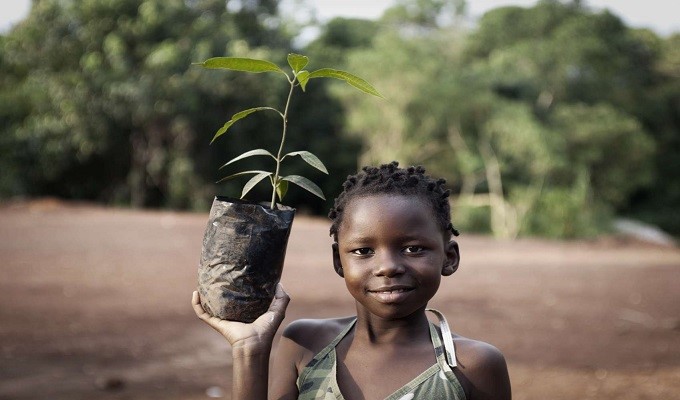
by Sophie McAdam at trueactivist.com
There’s not too much great news coming from the Climate Change Conference, but this is definitely worth celebrating!
Here’s some rare good news from the Climate talks in Paris: African nations have pledged to restore 100 million hectares (about 386,000 square miles) of forest by 2030. The ‘AFR100’ initiative is an ambitious and unprecedented plan by more than a dozen African nations to do what they can in the face of a climate catastrophe.
“As the world forges a climate agreement in Paris, African countries — which bear the least historic responsibility for climate change — are showing leadership with ambitious pledges to restore land,” said Andrew Steer, president and CEO of the World Resources Institute in a press statement. “These African leaders are turning their words into action and making a real contribution to respond to the global threat of climate change.”
Nine financial partners and 10 technical assistance providers have pledged support for AFR100, led by the New Partnership for Africa’s Development (NEPAD Agency), Germany’s Federal Ministry for Economic Cooperation and Development (BMZ), and World Resources Institute (WRI).
Although they cover only 7%, tropical forests shelter more than half of the world’s plant and animal species. Africa is currently losing 10 million acres of forest per year, greatly affecting the planet’s ability to regulate climate change and putting wildlife in danger of extinction. Africa‘s Congo Basin is the second largest rainforest after the Amazon, which is why the pledge to protect it is so important.
AFR100 recognizes the benefits that forests and trees can provide in African landscapes: improved soil fertility and food security, greater availability and quality of water resources, reduced desertification, increased biodiversity, green jobs, economic growth, and increased capacity for climate change resilience and mitigation. Forest landscape restoration has the potential to improve livelihoods, especially for women.
The announcement was made during the Global Landscapes Forum at the Climate Conference in Paris. According to The World Resources Institute, countries that have agreed to join the AFR100 initiative are:
• Democratic Republic of Congo (8 million hectares)
• Ethiopia (15 million hectares)
• Kenya (Committed, but finalizing hectare target)
• Liberia (1 million hectares)
• Madagascar (Committed, but finalizing hectare target)
• Malawi (Committed, but finalizing hectare target)
• Niger (3.2 million hectares)
• Rwanda (2 million hectares)
• Togo (Committed, but finalizing hectare target)
• Uganda (2.5 million hectares)
“Restoring our landscapes brings prosperity, security and opportunity,” said Dr. Vincent Biruta, Minister of Natural Resources in Rwanda. “With forest landscape restoration we’ve seen agricultural yields rise and farmers in our rural communities diversify their livelihoods and improve their well-being. Forest landscape restoration is not just an environmental strategy, it is an economic and social development strategy as well.”
“The scale of these new restoration commitments is unprecedented,” said Wanjira Mathai, Chair of the Green Belt Movement and daughter of Nobel Peace Prize Laureate Wangari Maathai. “I have seen restoration in communities both large and small across Africa, but the promise of a continent-wide movement is truly inspiring. Restoring landscapes will empower and enrich rural communities while providing downstream benefits to those in cities. Everybody wins.”
The video above from the Jane Goodall institute explains why Africa’s forests are so important to the wellbeing of our beautiful planet, and what the organization is doing to reforest chimpanzee habitats.
Let us know your thoughts below, and please share this uplifting news!
This article (Futuristic Bikini Will Clean The Ocean While You Swim! ) is free and open source. You have permission to republish this article under a Creative Commons license with attribution to the author and TrueActivist.com




